democracynow.org
Stories:

Exclusive Interview: Albert Woodfox of Angola 3, Freed After 43 Years in Solitary Confinement
After more than 43 years in solitary confinement, Albert Woodfox is a free man and joins us today for his first broadcast interview. The former Black Panther spent more time in solitary confinement than anyone in the United States, much of it in a six-by-nine cell for 23 hours each day. Albert Woodfox was released Friday after he entered a plea of no contest to charges of manslaughter and aggravated burglary of a prison guard more than four decades ago. Prior to Friday’s settlement, his conviction had been overturned three times. Albert Woodfox was serving a five-year sentence for armed robbery at the Louisiana State Penitentiary in Angola when he and fellow prisoner Herman Wallace were accused in 1972 of stabbing prison guard Brent Miller. The two men always maintained their innocence, saying they were targeted because they had organized a chapter of the Black Panther Party to address horrific conditions at the Angola prison, a former cotton plantation. Woodfox, Wallace and and a third man, Robert King, became collectively known as the Angola 3. For decades, Amnesty International and other groups campaigned to free the three men. Woodfox was the last remaining member of the group to be released. Today we speak to Woodfox and King, who was freed in 2001 when his conviction for killing a fellow inmate was overturned. Herman Wallace was freed in 2013, just days before he died from cancer.
TRANSCRIPT
This is a rush transcript. Copy may not be in its final form.
AMY GOODMAN: Today, a Democracy Now! exclusive. Joining me in hosting today’s broadcast is Democracy Now!’s criminal justice correspondent, Renée Feltz.
RENÉE FELTZ: Thanks so much, Amy. It’s great to be here. And welcome to all of our listeners and viewers around the country and around the world.
After more than 43 years in solitary confinement, Albert Woodfox is a free man. Woodfox has spent more time in solitary confinement than anyone in the United States. He was released from prison in Louisiana on Friday after four decades. The former Black Panther was kept in a six-by-nine cell for 23 hours each day. Albert Woodfox was released Friday after he entered a—a plea, I’m sorry—a plea of no contest to charges of manslaughter and aggravated burglary for a prison guard who was murdered more than four decades ago. Prior to Friday’s settlement, his conviction had been overturned three times. On Friday, Woodfox left Feliciana Parish jail, where he been held pending his trial, and headed to his mother’s gravesite.
ALBERT WOODFOX: I need to go say goodbye to my mother—I wasn’t allowed to go to her funeral when I was in Angola—and my sister, as well.
RENÉE FELTZ: Albert Woodfox was serving a five-year sentence for armed robbery at the Louisiana State Penitentiary in Angola when he and fellow prisoner Herman Wallace were accused in 1972 of stabbing prison guard Brent Miller. The two men have always maintained their innocence, saying they were targeted because they had organized a chapter of the Black Panther Party to address horrific conditions in Angola prison, a former cotton plantation.
Woodfox, Wallace and a third man, Robert King, became collectively known as the Angola 3. For decades, Amnesty International and other groups campaigned to free the three men. Woodfox was the last remaining member of the group to be locked up. Robert King was freed in 2001 when his conviction, that he had killed a fellow inmate, was overturned. Herman Wallace was freed in 2013, just days before he died from cancer. But the state of Louisiana refused to release Woodfox until now.
AMY GOODMAN: After Albert Woodfox’s first conviction was overturned, Louisiana successfully tried him a second time in 1998. Then, in 2014, a federal judge ruled he should be set free on the basis of racial discrimination in his retrial. When then-Louisiana Attorney General Buddy Caldwell announced plans to try Woodfox yet again, U.S. Middle District Court Judge James Brady ordered his release based on five factors: quote, "Mr. Woodfox’s age and poor health, his limited ability to present a defense at a third trial in light of the unavailability of witnesses, this Court’s lack of confidence in the State to provide a fair third trial, the prejudice done onto Mr. Woodfox by spending over forty years in solitary confinement, and finally the very fact that Mr. Woodfox has already been tried twice and would otherwise face his third trial for a crime that occurred over forty years ago," unquote. But the U.S. Fifth Circuit then approved Woodfox’s continued detention. Albert Woodfox was released on Friday after he entered a plea of no contest to charges of manslaughter and aggravated burglary.
Well, joining us now in a broadcast exclusive from New Orleans PBS station WLAE is Albert Woodfox himself, giving his first televised interview since his release on Friday. Also joining us there is Robert King, the other surviving member of the Angola 3. And Albert Woodfox’s attorney, Billy Sothern, also joins us from New Orleans.
We welcome you all to Democracy Now! Albert Woodfox, how does it feel to be free?
ALBERT WOODFOX: I haven’t quite figured it out yet, but it feels great.
AMY GOODMAN: Well, can you talk about what happened on Friday as you left the parish jail in New Orleans? This was after 45 years in prison, 43 years in solitary confinement. You’re the longest-standing prisoner in solitary confinement in the United States.
ALBERT WOODFOX: I guess, you know, for a moment there, everything seemed surreal. And we had to sit around, about an hour and some, waiting on the final documents to be faxed to the West Feliciana detention center. And when that finally happened and, you know, my brother and my attorneys, they walked out with me, and family and friends began to express joy and excitement. And we got in my brother’s car, and we slowly drove. And we answered a few questions, and then we proceeded to go say goodbye to my mother.
AMY GOODMAN: You visited your mother’s grave?
ALBERT WOODFOX: Yes, I did. Well, we weren’t able to see her because of the time involved. When me and my brother got there, the cemetery was closed. So we went to another cemetery where I could say goodbye to my sister and my brother-in-law, who passed away while, you know, I was still in Angola.
RENÉE FELTZ: Albert, it’s so great to have you join us. Can you explain the significance of going to visit your mother’s gravesite and why that was the first place that you wanted to go?
ALBERT WOODFOX: Well, when my mom passed away, I had made a request to go to her funeral and say my final goodbye. Warden Burl Cain denied that request. And the same thing happened with my sister when she passed away. My family and friends had made arrangements to allow me to go and say goodbye. Again, Warden Burl Cain denied that. So, for some years now, there has always been this emptiness when it came to my mom and my sister, because I never had a chance to say a final goodbye. And so, that’s why it was important that one of my first acts of being free was to relieve that burden off of my soul.
AMY GOODMAN: Albert, you were in solitary confinement for more than four decades at Angola, this what’s known as a plantation prison, known for the country in Africa where enslaved men and women were brought from and serving at that plantation, enslaved at that plantation. Then it became a prison, where thousands of mainly African-American prisoners are held. Describe your cell, where you lived.
ALBERT WOODFOX: Well, I lived in a concrete cell with bars in the front of it. As you enter the cell, there is a metal bunk attached to the wall, and there is also a combination sink and toilet bowl against the back wall.
AMY GOODMAN: And how did you keep your sanity? Explain how many hours a day you were kept in this cell. Were you ever allowed out?
ALBERT WOODFOX: Well, we got one hour a day. You know, when we were first put in CCR in ’72, myself, Herman Wallace and Robert King, we knew that if we had any chance of maintaining our sanity and, you know, not allowing the prison system to break us, that we had to keep our focus on society and not become institutionalized where we were only concerned with the things that were going on in the prison.
AMY GOODMAN: When you say "we," when you were allowed to go out, did you go out alone or with other people for the hour a day?
ALBERT WOODFOX: Yeah. Well, when we first were put in CCR, they used to let everybody out who wanted to shower on the tier, to take the hour together. But as time passed and some of the inmates started to protest some of the things that were going on, then, in order to dilute unity, they started letting us come out one at a time.
AMY GOODMAN: Were you able to read in your cell?
ALBERT WOODFOX: Yes. It was one of the tools we used to remain focused and to stay connected to the outside world.
AMY GOODMAN: What did you read?
ALBERT WOODFOX: History books, books on Malcolm X, Dr. Martin Luther King, Frantz Fanon, James Baldwin—you know, just any kind of literature that I could basically get a hold of.
AMY GOODMAN: And how often were you allowed to see visitors?
ALBERT WOODFOX: At that time, the visiting system, you were allowed 10 people on your approved visiting list, and each person could visit twice a month. But, you know, because of the long distance and the economic situation, my family was not able to come as much as they would have liked to. So, they tried to come at least once a month.
AMY GOODMAN: You were imprisoned—you were sentenced to five years, when you first went to prison. But then, when we come back from break, I want to talk about what ultimately you were charged with, after you and a guest who we’ll be joined by next, Robert King, as well as the late Herman Wallace formed a chapter of the Black Panther Party in the Angola prison. We’re talking to Albert Woodfox. He is the person longest held in solitary confinement in the United States. He was released on Friday after 45 years in prison, after 43 years in solitary. Stay with us.
[break]
AMY GOODMAN: "Yellow Ribbon," a song sung by Swedish artist Meja to support Amnesty International’s campaign to free Albert Woodfox, who was just freed on Friday. This is Democracy Now!, democracynow.org, The War and Peace Report. I’m Amy Goodman, with Democracy Now!’s Renée Feltz, in this Democracy Now! exclusive hour, Albert Woodfox speaking out in a television/radio broadcast for the first time since his release from a parish jail in New Orleans on Friday, met by his brother. The longest-standing solitary confinement prisoner in the United States, Albert was—served for 43 years in solitary.
We are also joined by Robert King. Robert King is another member of what became known as the Angola 3—Albert Woodfox, Robert King and Herman Wallace. Robert King spent 29 years in solitary confinement for a murder he did not commit. Billy Sothern is also with us, one of the trial attorneys representing Albert Woodfox.
Robert King, you have traveled the country, the world, trying to have the other members of the Angola 3—Herman Wallace, who died in 2013 a few days after he was released from Angola, died of cancer, and Albert Woodfox—freed, telling their stories. Can you talk about what it means for you to have Albert free?
ROBERT KING: Yes. Thank you, Amy. Of course I can tell you. For us—for me, personally, I think it was joyous. The jubilation in which—you know, that Albert may not have felt, the crowd felt it. We were overjoyed. Not that he wasn’t. The clouds that perhaps, you know—the clouds that were over him probably prevented the jubilation from being present, but it was there, and the crowd showed it. So it was a good thing for the crowd. It was a good thing for me personally. I think it was—it was a victory for justice finally being rendered, if you want to call it justice. Justice delayed, of course, they say, is justice denied. But nevertheless, it happened. And so, I was overjoyed that it had, quote, "finally" happened, because we had been here so many times and disappointed and let down so. But it was a joyous occasion, and Albert is here now, and he’s acclimating himself to his environment, his new environment.
RENÉE FELTZ: Thank you, King. Now, I want to go back to 1972 and this original charge that Herman Wallace and Albert Woodfox faced, that they murdered a prison guard, Brent Miller. A key witness in the case against them was a man named Hezekiah Brown, who said he witnessed the murder of Brent Miller. But his credibility was later called into question. I want to go to a clip from the documentary, In the Land of the Free, where we hear from a lawyer who represented the Angola 3 and who describes Hezekiah Brown. Now, after this, you’re going to hear from the narrator of the film, Samuel L. Jackson, the actor. This first, though, is Nick Trenticosta.
NICK TRENTICOSTA: Hezekiah first told the investigators at the prison that he was nowhere around, he didn’t know anything about the murder. A few days later, he’s dragged from his bed at midnight, put under the bright lights of interrogation and told, "If you help us crack the case, we will get you your freedom." At that point, he said it was Wallace and Woodfox.
SAMUEL L. JACKSON: And local author Anne Butler’s research recordings provided evidence of just how pliable Hezekiah Brown could be.
ANNE BUTLER: Well, at the trial, they called Hezekiah Brown, you know, and he said that he saw Woodfox and three other black men.
HILTON BUTLER: Hezekiah was one you could put words in his mouth.
RENÉE FELTZ: That last voice was Hilton Butler, a former warden at Angola prison, talking about Hezekiah Brown, a key witness in the state’s case against Albert Woodfox and Herman Wallace. Albert Woodfox, can you talk about the allegations against you and who is and who was Hezekiah Brown?
ALBERT WOODFOX: Yes. You know, at the time, myself and Herman Wallace was very active in the prison population, trying to organize resistance to some of the corruption that was going on, the brutalities, guys being murdered almost every day or brutally beaten. And so we think that when Officer Miller was killed, we automatically became public enemy number one as far as the security staff and the administration at the Louisiana State Penitentiary. And it was—although it was a shock, it was not a surprise. I was the first one of the A3 to be locked up in the dungeon for the Brent Miller killing. And the next day, I was moved to CCR, where I remained until my freedom on my birthday, February 19.
AMY GOODMAN: I mean, you were released on your birthday, February 19?
ALBERT WOODFOX: Yes, quite a birthday gift.
AMY GOODMAN: Well, on Friday, as you were released, Louisiana state Attorney General Jeff Landry said in a statement—he thanked the family of Brent Miller and that, quote, "their support has been instrumental in today’s very difficult decision." Miller’s sister, Wanda Callender, told The Advocate newspaper she felt the plea deal, quote, "was slammed in our face."
But Brent Miller’s widow has long said she did not believe that prisoners Albert Woodfox and Herman Wallace killed her husband. She released a statement last June saying, quote, "I think it’s time the state stop acting like there is any evidence that Albert Woodfox killed Brent. ... [A]fter a lot of years looking at the evidence and soul-searching and praying, I realized I could no longer just believe what I was told to believe by a state that did not take care of Brent when he was working at Angola and did not take care of me when he was killed," unquote. So I want to go to a clip of Teenie Rogers, who was just 17 when her husband, Brent Miller, was stabbed to death in 1972. She was interviewed in the 2010 documentary, In the Land of the Free.
TEENIE VERRET: I’ve been living this for 36 years. There’s not a year that goes by that I don’t have to relive this. And it just keeps going and going. And then these men, I mean, if they did not do this—and I believe that they didn’t—they have been living a nightmare for 36 years.
AMY GOODMAN: That was Teenie Rogers, who is also called Teenie Verret. Your response, Albert Woodfox, when you hear Officer Miller’s wife saying that she did not believe that you were guilty? This, the reason you were put on—put in solitary confinement and held there for more than four decades.
ALBERT WOODFOX: Well, you know, I was—you know, I guess, for lack of a better word, I was shocked when I learned that she had taken a position that, after looking at the evidence and, you know, just—I guess it just never felt right to her that we were a part of whoever killed her husband. And I think it was very brave on her part to publicly state that.
AMY GOODMAN: Now, Louisiana Attorney General Jeff Landry issued a statement about the state’s plea agreement with you, saying, quote, "After carefully considering all of the facts and circumstances surrounding this case and its procedural history, as it stands today—our team of prosecutors believes this plea is in the best interest of justice." Landry was recently elected to replace the former Louisiana attorney general, Buddy Caldwell, who had successfully appealed to prevent Albert Woodfox’s release last year after a federal judge ordered him freed. Another key figure no longer active here is longtime Angola Warden Burl Cain, who said he would keep Woodfox in lockdown, regardless of his crimes, since, quote, "I still know that he is still trying to practice Black Pantherism," unquote. Cain resigned last year after he came under investigation for violating prison policy by entering into real estate deals with family members of Angola prisoners. I’m wondering if you can talk about the role of Burl Cain and Buddy Caldwell in the Angola 3 case and these latest developments, Albert?
ALBERT WOODFOX: Well, obviously, Burl Cain and Buddy Caldwell made this case personal, so personal to the point where they totally disregard the Constitution, statutory law, due process, lack of evidence, and just decided that, you know, I was guilty, Herman was guilty, and they would do everything they could to keep us in jail until we both died. Unfortunately, they almost succeeded. But as tragic as it was to lose Herman, he died a free man.
RENÉE FELTZ: Now, Albert, can you clarify, please, this no contest plea that you entered on Friday? Talk about—you know, we’ve come to this point after more than four decades where you were able to come to this agreement with the state, after maintaining your innocence this entire time. Now you have a no contest plea. But not everyone understands what that means and maybe why you did that. So, can you explain that for us?
ALBERT WOODFOX: Well, the plea, nolo contendere, it’s a plea—for me, it was a plea for my freedom, not a plea of guilt. And I had to factor in the fact of, you know, my age. I have some serious health issues, and I wasn’t getting the proper treatment for these issues. I wanted to get back to my family. And, you know, my lawyers, my attorneys, they worked so hard to make this a reality. So, when this opportunity came up, as distasteful as it was, it gave me the opportunity to reunite with my family and my—and, you know, just—
AMY GOODMAN: Well, let me ask—
ALBERT WOODFOX: No, go ahead.
AMY GOODMAN: I wanted to ask Billy Sothern, your lawyer, about the significance of Buddy Caldwell—finally, in Louisiana, he was defeated—and Jeff Landry, the new attorney general, coming into office. Billy Sothern, you’re one of the trial attorneys who represented Albert Woodfox, one of the Angola 3. Talk about what that change of attorney general meant and also what prison warden Cain being forced out meant.
BILLY SOTHERN: Attorney General Caldwell, the former attorney general, had such a deeply—deep misconceptions about Albert and this case. He referred, fairly recently, to Mr. Woodfox as one of the most dangerous men on the planet. So, this is someone whose appraisal of this case has never made any sense. He also committed to refusing to test a bloody fingerprint that was found at the crime scene, that was never matched to anybody, that specifically did not match Albert, did not match his co-defendants, did not match anyone that it had been tested against. But they had the fingerprints of all of the inmates at Angola on that day in 1972 and steadfastly refused to compare that fingerprint against other inmates, which of course could have identified the real killer. Buddy Caldwell’s words on that were, "Well, we won’t be fooled by those fingerprints."
So this is someone who had such misconceptions about this case that really any sober-minded person replacing him and making an honest assessment of the case was going to come to it without all of his biases and prejudice and come to different conclusions. And we really believe that that’s part of what happened, is that a more reasonable assessment was made about the case, a more reasonable assessment was made about Albert, because, frankly, no one could have been more unreasonable than Buddy Caldwell.
AMY GOODMAN: And Burl Cain, the significance of the warden, and the conditions that Albert Woodfox and Herman Wallace, and before that, as well, Robert King, were held in?
BILLY SOTHERN: Obviously, you know, for 43 years—for 46 years, Albert has been incarcerated there at Angola. And he has struggled and Robert has struggled and others have struggled to improve things. And it’s a testament to these men that they essentially outlasted some of the very, in many ways, mean-spirited people who were very dedicated to seeing that their circumstances never changed. So, advocating on their own behalf, developing followers all around the world, you know, Albert, Robert, others have been able to outlast, in a very improbable way, even figures like Burl Cain and Buddy Caldwell, who seemed so entrenched here.
AMY GOODMAN: And what nolo contendere means, as a lawyer, explain. You have Albert Woodfox, who has served 45 years in prison, 43 of those years in solitary confinement. What it means now to plead no contest, nolo contendere, to manslaughter and aggravated—what was it—burglary?
BILLY SOTHERN: Aggravated burglary, yeah. So, essentially what it means is that Albert gets freed. And the legal proposition is essentially that Albert can maintain his innocence, that he—and he has maintained his innocence, as he has consistently for 43 years, but that it’s an acknowledgment that the—that there is evidence that could support a conviction.
And, of course, Albert has been wrongfully convicted two times by an array of witnesses who lied to secure his conviction. We litigated everything incredibly strenuously in this case, and we were very dedicated to make sure that the injustice that had previously occurred in Albert’s case twice, with two convictions, did not repeat itself. And we litigated issues like excluding the prior witness testimony of Hezekiah Brown, other witnesses, and they wanted to just bring in these transcripts of these witnesses. But, in fact, these witnesses had lied, and, in fact, the government had suppressed evidence that would have allowed Albert to impeach these witnesses at their earlier trials. And you will not be surprised to find out that notwithstanding very aggressive and competent litigation on that point by myself and Robert McDuff, Albert’s other trial attorney, we lost those issues at the trial court just recently. We appealed those, and it was our intention to appeal those all the way to the Louisiana Supreme Court, but we lost that appeal on those issues to the—in the First Circuit Court of Appeals. So, those testimonies were coming in.
And I’ve been practicing in Louisiana long enough to know that I need to make a realistic assessment of the courts here and that the injustices that had previously occurred in Albert’s case, we could not be guaranteed that those would not occur again, because this is a West Feliciana Parish jury in the heart of Louisiana. We litigated, for instance, that the venue needed to be changed, because, of course, Albert could not get a fair trial in a community where he is infamous and where there’s prison guards and associates of the prison in almost every home. We did a 43-year survey of the incredibly damning media portrayal of Albert. And we lost that motion.
So the trial was going to be back in West Feliciana Parish. This bogus testimony was going to come back in. And in addition to all of that, we have Albert’s health problems, and we have his long struggle, and he had an opportunity for freedom. And that was absolutely the choice that we advised him to take, because, for us, Albert’s—the incredible things that he’s done in prison will only be greater now that he’s out. And he deserved the opportunity to be out, and he deserved the opportunity not to have to trust a Louisiana jury to make the right choice in this case, when they’ve done the wrong thing two previous times.
AMY GOODMAN: We’re going to break, then come back to this discussion. And I want to ask Albert Woodfox what it was like, chained and shackled, to see Herman Wallace for the last time, when you got to say goodbye to him, along with Robert King, the three of you together for a final time as Herman lay dying in the prison, but a judge demanding of the prison warden that Herman Wallace be freed, or else the warden would go to jail. We’re talking to Albert Woodfox, the longest-standing solitary confinement prisoner in the United States; Billy Sothern, his attorney; and Robert King, also a member of the Angola 3, who spent 29 years in solitary confinement. This is Democracy Now! We’ll be back in a minute.
[break]
AMY GOODMAN: "Almost Free" by Sarah Quintana, a New Orleans artist who was a pen pal with the late Herman Wallace, a member of the Angola 3 who was held in solitary confinement for more than 40 years. He died in 2013, three days after his release from prison in Louisiana last October. This is Democracy Now!, democracynow.org, The War and Peace Report. I’m Amy Goodman, with Democracy Now!’s Renée Feltz. And we are bringing you a Democracy Now! special today, an exclusive hour with two of the Angola 3. Albert Woodfox, the longest-standing solitary confinement prisoner in the United States, was freed on Friday. This is his first extended television/radio interview. Robert King is also in the New Orleans studio at public television station WLAE, a member of the Angola 3, held for 29 years in solitary confinement, and Billy Sothern, one of the trial attorneys representing Albert Woodfox.
Albert, I want to go to a clip of Herman Wallace, in his own words, describing the impact of solitary confinement on his body. He spoke in phone calls from the prison, that was featured in the documentary, Herman’s House.
HERMAN WALLACE: Being in a cage for such an extended period of time, it has its downfalls. I mean, you may not feel it, you may not know it, you may think that you’re OK, and you just perfunctorily move about, you know. However, when you was removed from out of that type of situation and placed in an open environment where, you know, you’re even breathing that oxygen and it’s getting into your lungs and you’re feeling something growing within you, and—you begin to develop a different mode within your body. I even watched my body. I’ve looked in the mirror, and I’ve seen muscles and [bleep] begin to pop out there. I began to run even faster and [bleep]. And I’m saying, "Whoa, what the hell is going on here?" Much was preserved. But then I got locked up again after eight months. And being locked up like that, the whole body just got confused.
AMY GOODMAN: That was Herman Wallace describing solitary confinement. In 2013, as he lay dying in Angola, in prison, dying of cancer, a judge ruled that he should be released immediately. The prison warden said he wouldn’t be coming back to the prison immediately, and the judge said if he didn’t release Herman Wallace—an ambulance had pulled up to the prison—that the warden himself would be imprisoned. But before he left that prison, Albert Woodfox and Robert King got to say goodbye. Albert, what was it like? Because as you came to see Herman, you and Robert King learned that Herman would be freed, and you were the ones to deliver that news to Herman Wallace. You were shackled at the time?
ALBERT WOODFOX: Yes. You know, because the Attorney General’s Office would not allow Herman, Robert and myself to have a conference with our attorneys, we had to ask the court to intervene. So, they were under court instructions to, at least once a month, to allow us, all three of us, to meet together with our attorneys. These visits were taking place at Hunt’s, because, at the time, Herman was battling cancer. Robert was free, and I was being held in the David Wade correctional institution. So they had to transport me. But on this particular visit, Herman was very ill, and they didn’t expect him to live beyond the weekend, but somehow he did. And the DOC wanted to cancel the visit. So I was desperate to see Herman, because I knew how sick he was. So a suggestion was made that they would let the visits go, if I would agree to keep my restraints on. And one of the restraints on is called a black box. It’s supposed to be used for travel only. It kind of locks your hands in a very uncomfortable and painful position. But, you know, nothing short of death would have stopped me from going to see Herman that one last time.
And so, when I got there, Robert and two of the attorneys was in the hospital room with him. And you could see, you know, that he was battling. And I kind of felt like he knew he was dying, and—but he was determined to last for that one last visit, you know. And during—you know, he was laying in the bed, and King and I and the lawyers, you know, we were just talking amongst ourselves, talking to him, trying to find some way to comfort him, as well as ourselves. And one of the attorneys was called away, Ms. Carine Williams, and she had a conversation with George Kendall, who was our lead attorney, that Herman’s conviction had been overturned, and he had been ordered released immediately. And, you know, I was—you know, all of us, we were just shocked, stunned, elated. And, you know, we just didn’t know what to do. So we just tried to comfort him and talk to him and try to get him to understand what had happened. And for me, I had to leave at 3:00, so I didn’t get a chance to see him actually leave. But, you know, it was just a great, great moment. It kind of made up for all the pain and suffering that all three of us went through being locked in solitary confinement.
RENÉE FELTZ: Albert, you and King are still pursuing a civil rights lawsuit. And your attorney, George Kendall, who’s handling this civil case, said Friday, in a statement, quote, "Although we are overjoyed that Albert Woodfox is finally free, it is indefensible he was forced to endure decade after decade in harsh solitary confinement conditions, longer than any prisoner in the history of the United States. Albert survived the extreme and cruel punishment of 40 [plus] years in solitary confinement only because of his extraordinary strength and character. These inhumane practices must stop. We hope the Louisiana Department of Corrections will reform and greatly limit its use of solitary confinement as have an increasing number of jurisdictions around the country." Now, of course, this has happened both at the local level as well as federally, with President Obama announcing solitary reforms in an executive order and recently announcing in an op-ed that he wanted to reduce solitary confinement for juveniles. Now, I wanted to get your take on this reason that you’re pursuing a civil lawsuit still and your response to some of these reform measures that have been announced.
ALBERT WOODFOX: You know, Herman, Robert and myself, we had been transferred to a punishment camp in Angola called Camp J, because we had participated in a hunger strike to force the administration to give us, you know, some humane treatment and provide us with an avenue in which we could help ourselves, improve ourselves. So, you know, we had always—this was not the first suit we had to file about long-term cell confinement. And, you know, when we was released from Camp J, we decided that we need to try to challenge this again, we need to try to change this barbaric treatment of locking a man in a cell for 23 hours a day for decades. And for us, it was about that, and it continues to be about that.
RENÉE FELTZ: And what do you think of the reforms that have been announced by President Obama and other jurisdictions that are taking steps to reduce solitary confinement? I know you follow the news a little bit. What’s your response to these? Are they far enough? And what would you like to see happen?
ALBERT WOODFOX: Well, you know, I think, as a result of our suit, and thanks to the International Coalition to Free the Angola 3 and Amnesty International and other groups around the country and around the world, we inspired other guys in solitary confinement in other states, in other prisons, to try to do something about these conditions. So, we’ve put this solitary confinement issue before American people, before the people of the world, and it just started building, you know, and it got to the point where it wasn’t just about the Angola 3, but it was about solitary confinement.
AMY GOODMAN: We’re going to have to—
ALBERT WOODFOX: And—
AMY GOODMAN: Albert, we’re going to have to leave it there, but we’re going to continue our discussion and post it online. Albert Woodfox, the longest-standing solitary confinement prisoner in the United States, released on Friday. And thanks to Robert King and Billy Sothern. I’m Amy Goodman, with Renée Feltz. Thanks so much for joining us.
... Read More →Headlines:
Albert Woodfox Released from Prison After More Than 43 Years in Solitary
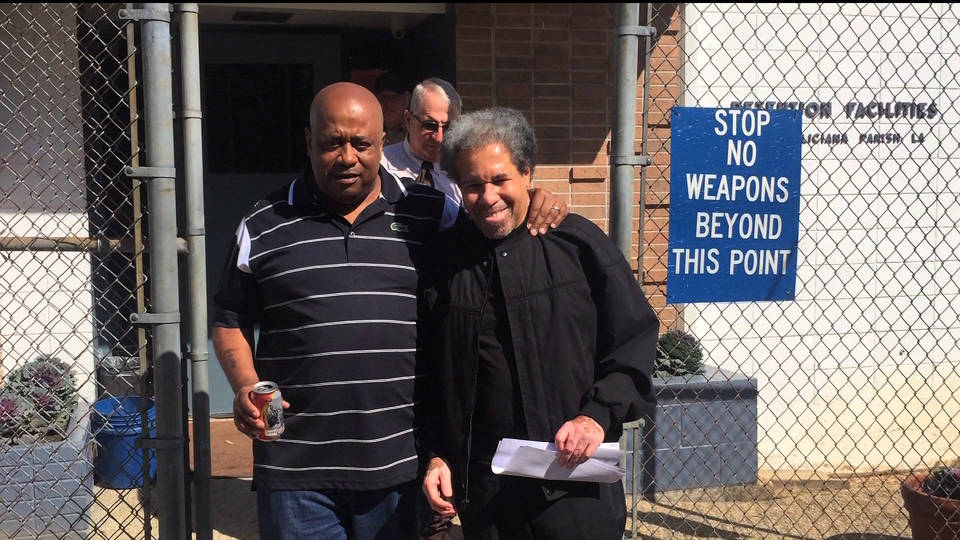
Albert Woodfox, who spent more than 43 years in solitary confinement—more than any one else in the United States—has been released from prison in Louisiana. Woodfox walked free on Friday after he entered a plea of no contest to charges of manslaughter and aggravated burglary of a prison guard more than four decades ago. Prior to Friday’s settlement, his conviction had been overturned three times. Woodfox and the late, fellow Angola 3 member Herman Wallace were accused in 1972 of stabbing prison guard Brent Miller. They always maintained their innocence, saying they were targeted because of their attempts to address horrific prison conditions by organizing a chapter of the Black Panther Party. Herman Wallace was freed in 2013, just days before he died from cancer. We’ll be joined by Albert Woodfox in his first broadcast interview after headlines.
TOPICS:
Angola 3
Solitary Confinement
Prison
Syria: Bomb Attacks Kill 150; U.S., Russia Reach "Provisional" Ceasefire Deal

In Syria, bomb attacks around the Syrian capital Damascus and in the city of Homs have killed at least 150 people and wounded scores of others, marking one of the deadliest days in the nearly five-year-old conflict. ISIL has claimed responsibility for Sunday’s attacks, which included a car bombing and two consecutive suicide attacks near a Shiite shrine outside Damascus and two bomb attacks in the city of Homs. The blasts came the same day Secretary of State John Kerry announced a "provisional agreement" between the United States and Russia on a ceasefire in Syria.
TOPICS:
Syria
Islamic State
Libya: U.S. Airstrikes Kill 2 Serbian Hostages
U.S. airstrikes on a suspected ISIL training camp in Libya have killed two Serbian hostages. The hostages were a communications officer and a driver on staff at the Serbian Embassy who were taken hostage in November. They were among about 50 people killed in Friday’s U.S. airstrikes. Serbian Prime Minister Aleksandar Vucic said Serbia had been close to securing the hostages’ release.
Prime Minister Aleksandar Vucic: "This is the first major hostage crisis that the Republic of Serbia has faced. Our state security acted very professionally, very seriously. If they had not been killed in allied—meaning U.S.—bombing, our people would have been freed, as we have said so many times before."
TOPICS:
Libya
Fiji Hit by Record Storm; 17 Killed

The Pacific island of Fiji has been hit by the most powerful storm ever recorded in the Southern Hemisphere. Cyclone Winston killed at least 17 people and flattened entire villages. Thousands were forced to evacuate. Aid groups have warned of a looming health crisis after supplies of fresh water were blocked in some areas.
TOPICS:
Climate Change
Clinton Beats Sanders in Nevada Democratic Caucuses
Former Secretary of State Hillary Clinton has beat Vermont Senator Bernie Sanders in the Nevada caucuses, winning 53 percent versus Sanders’ 47 percent. Clinton celebrated her victory Saturday night.
Hillary Clinton: "We need more than a plan for the big banks. The middle class needs a raise, and we need more jobs. We need jobs that pay well and can’t be outsourced, jobs that provide dignity and a future."
Exit polls show Sanders again dominated among young people, with 82 percent of under-30 voters. Clinton won strong support among African-American voters, a bad sign for Sanders heading into this week’s Democratic primary in South Carolina. Despite beating Clinton in the earlier New Hampshire primary, a tally of delegates so far shows Sanders has just 70 delegates while Clinton has 502. That’s in part thanks to unelected superdelegates, often lobbyists or elected officials who represent the party elite and aren’t beholden to what voters want. Sanders vowed to continue his campaign for the nomination.
Sen. Bernie Sanders: "We have come a very long way in nine months. It is clear to me—and, I think, most observers—that the wind is at our backs. We have the momentum. And I believe—I believe that when Democrats assemble in Philadelphia in July at that convention, we are going to see the results of one of the great political upsets in the history of the United States."
TOPICS:
Hillary Clinton
Bernie Sanders
Democratic Party
2016 Election
Donald Trump Wins South Carolina GOP Primary; Rubio Comes Second
In South Carolina, Republican candidate Donald Trump sealed his place as front-runner, winning the primary with 32.5 percent of the vote. Florida Senator Marco Rubio closely beat Texas Senator Ted Cruz for second place. Trump’s victory came a day after he cited a story about a U.S. general who supposedly executed Muslim prisoners a century ago using bullets dipped in pigs’ blood. There’s no evidence the story Trump told about General John Pershing’s actions in the Philippines is actually true.
Donald Trump: "And he took the 50 terrorists, and he took 50 men, and he dipped 50 bullets in pig’s blood. You heard that, right? He fit—he took 50 bullets, and he dipped them in pig’s blood. And he had his men load his rifles, and he lined up the 50 people, and they shot 49 of those people. And the 50th person, he said, 'You go back to your people, and you tell them what happened.'"
Jeb Bush Ends Bid for Republican Presidential Nomination

Following a decisive loss in the South Carolina primary, former Florida Republican Governor Jeb Bush ended his bid for the 2016 Republican presidential nomination.
Jeb Bush: "I’m proud of the campaign that we’ve run to unify our country and to advocate conservative solutions that would give more Americans the opportunity to rise up and reach their God-given potential. But the people of Iowa and New Hampshire and South Carolina have spoken, and I really respect their decision. So tonight I am suspending my campaign."
TOPICS:
2016 Election
Republican Party
Michigan: Uber Driver Accused of Killing 6 in Shooting Rampage

In Kalamazoo, Michigan, officials say six people were killed and two injured when an Uber driver went on a four-hour-long shooting rampage, opening fire on people seemingly at random. Jason Brian Dalton allegedly shot people at three different locations: a woman outside an apartment complex, a father and a son looking at cars at an auto dealership, and a group of women parked at a Cracker Barrel restaurant.
TOPICS:
Michigan
Bolivia: Evo Morales Appears to Lose Referendum Allowing 4th Term
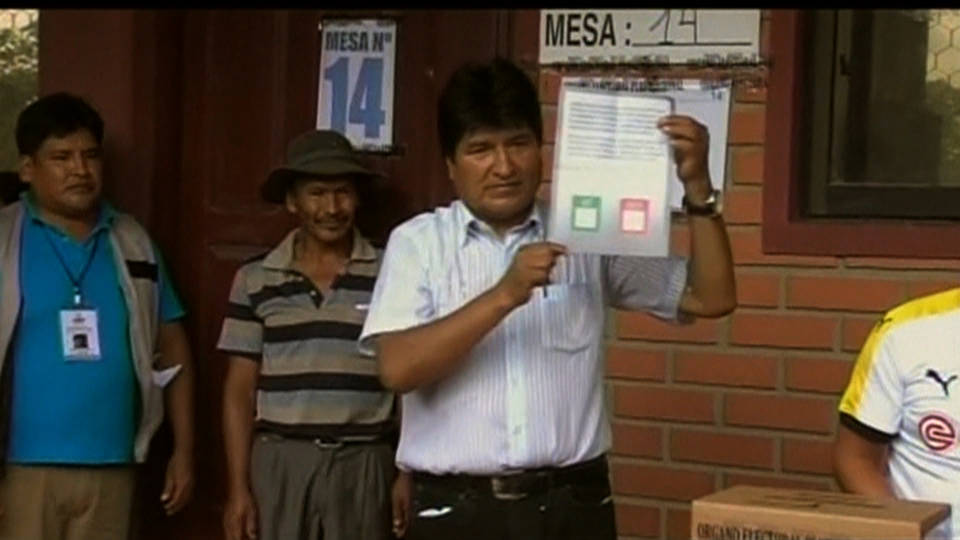
In Bolivia, President Evo Morales appears to have narrowly lost a referendum allowing him a fourth term in office. Morales’ current term ends in 2020; the referendum would have amended the constitution to allow him to remain until 2025. In 2006, Morales took office as Bolivia’s first indigenous president.
TOPICS:
Bolivia
Brussels: Greenpeace Activists Block Building to Stall Massive U.S.-EU Trade Deal
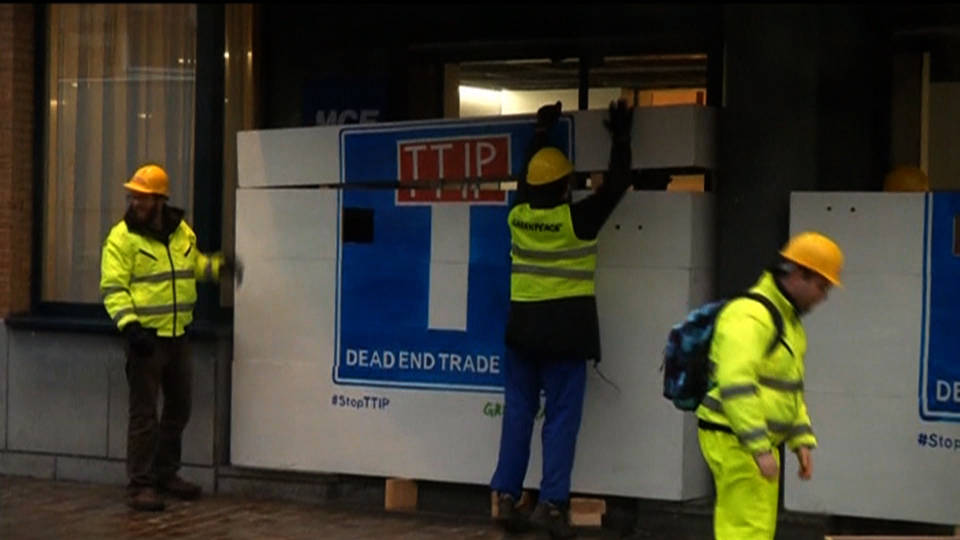
In Brussels, Greenpeace activists have blocked the entrance of a building to stop negotiators from the United States and European Union from meeting behind closed doors to negotiate a massive trade deal. Opponents say the Transatlantic Trade and Investment Partnership would expand corporate power at the expense of public health and the environment. Saskia Richartz, deputy director of Greenpeace Europe, announced the protest.
Saskia Richartz: "Greenpeace has blocked U.S. and EU negotiators from discussing a trade deal that threatens democracy, our environment, social standards and working conditions. In fact, this trade deal is not at all about trade. It’s about transferring powers from the people to big business. What they call barriers to trade are in fact the safeguards that protect our air and food from being poisoned."
TOPICS:
Corporate Power
NYC: Protesters Show Solidarity with Flint, Honor Malcolm X
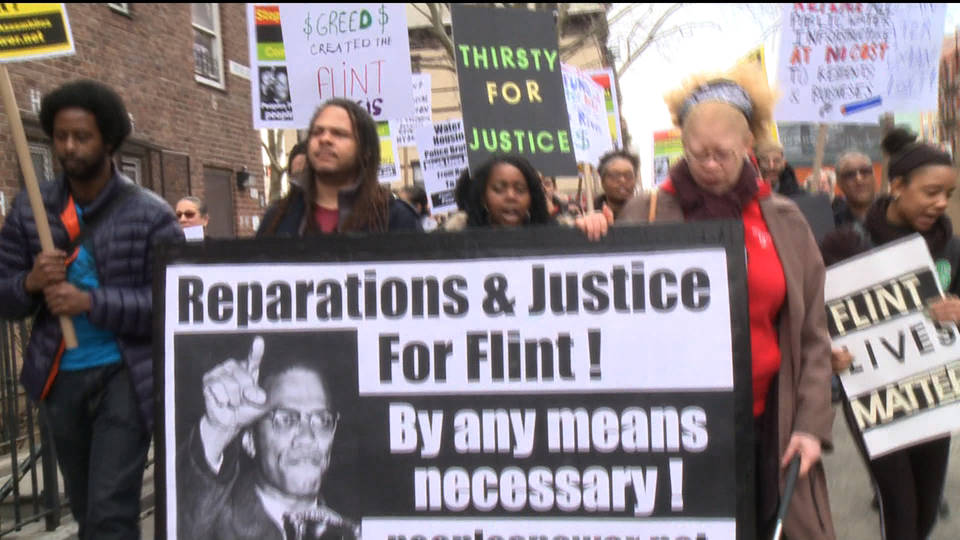
In New York City, nearly 100 people gathered in Harlem to mark the 51st anniversary of Malcolm X’s assassination and to demand justice for residents of Flint, Michigan, over the lead poisoning of the city’s drinking water. Peggy Shepard with the Harlem-based group WE ACT spoke about the connections between the water crisis in Flint, which is a predominantly African-American city, and high levels of pollution in other African-American communities such as Harlem.
Peggy Shepard: "We are here to stand in solidarity with Flint, because this is a gross example of environmental racism. We started here in Harlem because of the inordinate amount of pollution in this community that’s been making people sick. And we work within the national environmental justice movement to right these wrongs, because millions of people in this country, predominantly people of color, do not have clean water, clean air and safe schools."
TOPICS:
Malcolm X
Michigan
Texas Official Forced to Retire After Co-authoring Study on Harms of GOP Birth Control Policy
In Texas, a health official has been forced to retire after co-authoring a peer-reviewed study on the negative effects of anti-choice state policies on reproductive health. Rick Allgeyer, director of research at the Texas Health and Human Services Commission, co-authored a study that documented a drop in birth control access after Texas banned Planned Parenthood from a state family planning program. Allgeyer stepped down after a Republican lawmaker complained about the study.
TOPICS:
Texas
Abortion
Birth Control
Judge Orders Kesha to Remain in Contract with Producer She Says Raped Her
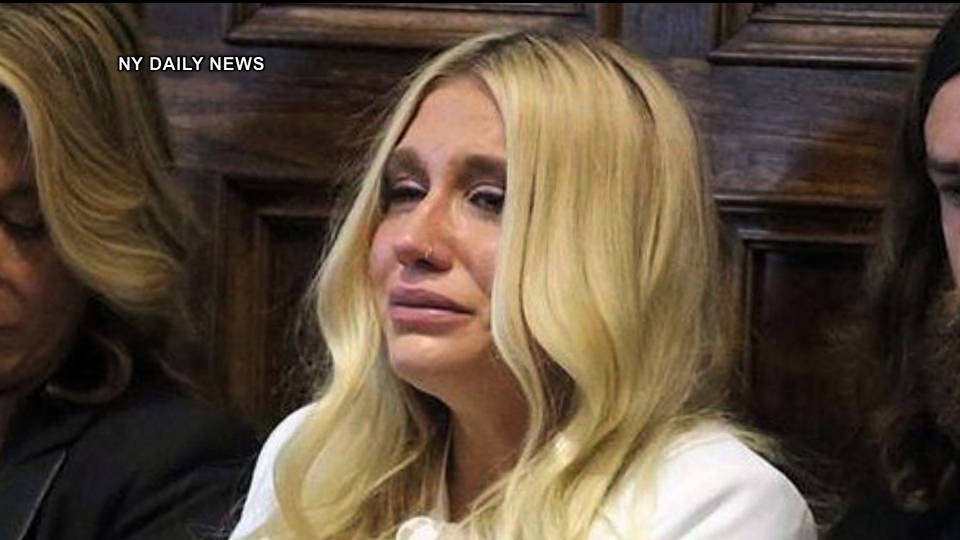
A judge has ordered pop star Kesha to remain in a contract that forces her to work with the producer she says drugged and raped her when she was 18. Kesha was shown sobbing in court after a judge upheld the contract. Manhattan Supreme Court Justice Shirley Kornreich said, "My instinct is to do the commercially reasonable thing." The contract requires Kesha to record six more albums with Sony, despite accusations of abuse against producer Luke Gottwald.
TOPICS:
Sexual Assault
Music
Harper Lee, Author of "To Kill a Mockingbird," Dies at 89
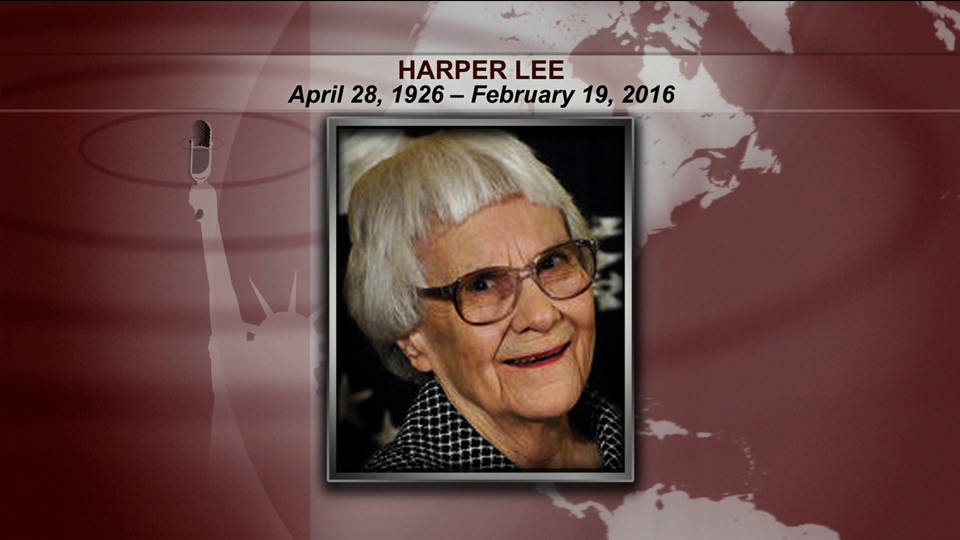
Harper Lee, the Pulitzer Prize-winning author of the novel "To Kill a Mockingbird" about racial injustice in the South, has died at the age of 89. Lee, who avoided the public spotlight, was the center of media attention last year when her publisher announced the release of "Go Set a Watchman," an early version of "To Kill a Mockingbird," which Lee’s attorney said she stumbled upon decades after it was written. Lee died in her sleep in her hometown of Monroeville, Alabama, which the town of Maycomb in "To Kill a Mockingbird" was modeled after. She was buried in a private ceremony.
Italian Scholar Umberto Eco, Author of "The Name of the Rose," Dies at 84
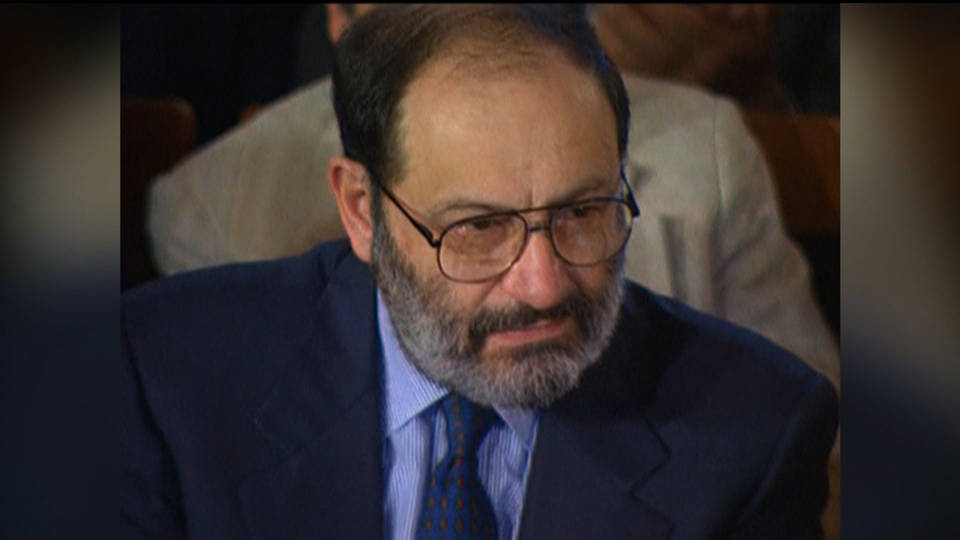
And the Italian scholar and author Umberto Eco, best known for his best-selling 1980 novel "The Name of the Rose," has died at his home in Milan. He was 84.
Donate today:
Follow:

"Thirsty for Democracy: The Poisoning of an American City": Complete Democracy Now! Special on Flint
DN! IN THE NEWS

WATCH: Amy Goodman Critiques Media Coverage of Election 2016 on CNN's Reliable Sources
SPEAKING EVENTS

2/22 Columbus, OH
WEB EXCLUSIVE

Update: Albert Woodfox, Last of the Angola 3, is Free After 43 Years in Solitary Confinement
WORK WITH DN!

Broadcast Engineer
Director of Finance and Operations
Director of Development
--------------------207 West 25th Street, 11th Floor
New York, New York 10001, United States
---------------------
---------------------




No comments:
Post a Comment